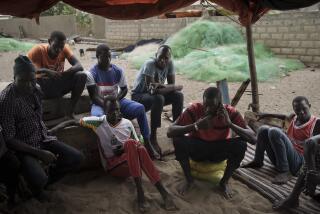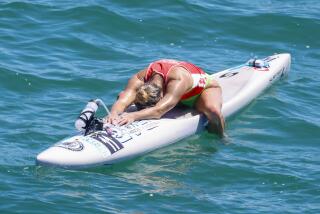South African Has Seen Rough Seas : Sailing: Neal Petersen experienced tough times in his homeland, but it helped prepare him for a new challenge--competing in the Trans-Atlantic race.
- Share via
Neal Petersen was born in South Africa without hip sockets, and his ambition is to race a sailboat solo across the Atlantic, which will cost $150,000.
His message: “If you want it badly enough, you can get it.”
Petersen, 22, a black, is not easily daunted, not by the racial inequalities of his homeland nor the magnitude of his campaign to compete in the Carlsberg Singlehanded Trans-Atlantic Race--the C-STAR--in 1992, and certainly not by the sea.
His nickname is “Neptune,” from the day some friends presented him with a trident.
“That’s how most of my friends have known me after seeing me around the water for a long time--diving, sailing,” he said.
He came to Southern California in 1985 to pursue his father’s profession as a commercial diver, and from his savings he is having a 38-foot boat built to his specifications in a South African yard for $95,000. For the last few months, he has traveled the United States and Britain seeking sponsorship.
Petersen is troubled that international sport has largely bypassed South Africa in recent years--most demonstratively of all, the current, quadrennial Whitbread Round the World Race that made its statement by choosing not to stop at Cape Town, his hometown, this time but to sail a 7,650-mile leg directly from South America to Australia, hardly waving as it passed the Cape of Good Hope.
Petersen doesn’t quarrel with the reasons. He grew up classified as “coloured” on government documents, and yet has received some financial support from white South African businessmen. A few years ago, he was even asked to join the Royal Cape Yacht Club.
“It was a bit of an embarrassing situation,” Petersen said. “Some of the people I’d been sailing with proposed my membership for me. The yacht club allowed that whether they allowed my membership or not, they weren’t going to stop my racing. So they shrugged their shoulders and said, ‘Why not?’
“I disagree totally with the classification system. We’re all people. I’m an oppressed South African. This race has not been done by an oppressed South African before. There are companies and people in South Africa--so-called ‘whites’--who want to see a complete change. A few sensible people realize the world is changing and that we have to change with the times.
“Now I’m able to give (them) an opportunity to voice their objections by backing my campaign. I’ve named it ‘Freedom Challenge.’ I want to see my country a free country, but without violence. I totally oppose violence.”
Petersen has reserved naming his boat until all the returns are in.
“Whoever comes up with the most money will get that honor,” he said.
Petersen rose from better circumstances than some of his countrymen. His handicaps were more physical than financial. At 18 months, when he still wasn’t walking properly, it was learned he had no sockets in his hips. It took three major operations over the next 5 1/2 years to correct the problem, and today he walks normally, but he lost a bit of his boyhood.
“That did not allow me to run around and kick a ball or to horseplay like the other boys,” he said.
Much of his therapy was done in a swimming pool.
“While other boys learned to kick a ball, I learned to snorkel. I spent vast quantities of my time under water, and my respect of the sea started building.”
He said his father “taught me that the sea was something you could not take for granted and treat it like a play toy, because it can destroy you. It has no mercy. The sea does not make any difference between black or white, rich or poor, someone with disability or someone perfectly healthy. It has no discrimination.”
For a time he worked on North Sea oil rigs and experienced what he called, “hair-raising marine conditions.
“I realized how weak we human beings are against the sea. The sea is very much alive--in a way, human. I can relate to the sea’s many different moods. The sea has so much life in it. When I’m out there sailing on my own, the whales and dolphins and birds become companions. They’re also telltales of conditions. When conditions pipe up, the dolphins get excited. The boat starts accelerating and they’ll come play around your boat.”
That’s why Petersen said he doesn’t worry about the solitude of solo sailing. “I feel more alone in cities than at sea.”
Petersen has done considerable offshore sailing, including an 8,000-mile Atlantic crossing as crew, but his longest solo voyage has been five days--out of Long Beach and around San Clemente Island on a friend’s boat. He plans two crossings of the Atlantic before the ’92 race.
“I’ve met a few people who would like to do a thing like I’m doing, but they’ve never been able to get it off the ground,” he said. “One of the motivations behind the race is that I’ve had to overcome a hip disability, I’ve had to overcome racial discrimination, and I’m young, one of the youngest people in the race.
“I want other young people in the world to look and say, ‘Hey, he’s like us.’ If he could overcome all the disadvantages and finish the race, why can’t we do it in our everyday living? I want this to inspire them.”
More to Read
Sign up for The Wild
We’ll help you find the best places to hike, bike and run, as well as the perfect silent spots for meditation and yoga.
You may occasionally receive promotional content from the Los Angeles Times.






